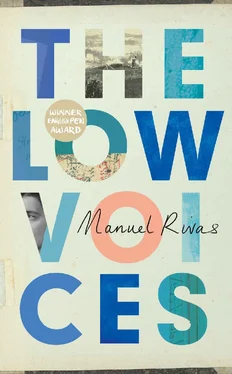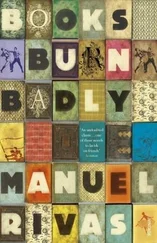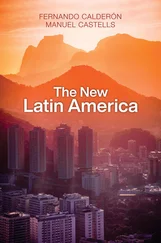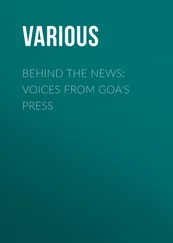María and Aunt Pepa
I have already spoken about him. He retired some time ago. Even so, at the age of ninety, old clients still solicit his presence at home, in an old people’s home, in hospital. Francisco resists, but ends up going. With his vanity case. Scissors and comb. And memory. The vanity case of memory. Words. Because he knows he hasn’t been called for his skill as a hairdresser. What they want is to listen to him. And if he has his scissors with him, well, so much the better, for dotting the suspense. A tap of the scissors. There is the inflection. The unforeseen.
The scissors slice through the air. One moment. Time to rewind.
The king of the mountains was O Xalo. When night falls, it has the disposition of a wild, stubborn land that wants to see the sea again. It’s still an impressive mountain, but back then it was even more so. There were no tarmacked roads, nor had half its back been built on. It was a mountain that allowed you, or refused to allow you, to pass. Every time, you had to find a way through. And that was where Manuela stepped on the sun.
She was eight. Her two brothers had been recruited for the war. So it was her turn — there was nobody else — to drive the cattle to pasture. The cows, two oxen and a horse.
‘Go to O Xalo. There’s plenty of grazing. They’ll run free, more or less. You won’t have to watch where they’re stepping.’
‘How long for?’
‘Come back when you step on the sun.’
However much she asked, she couldn’t work out how she was going to step on the sun. Until the time came. She spent the whole afternoon waiting. On tenterhooks. With an eye on the sun. How she was going to step on it. Until the moment arrived, and it was really quite simple. The sun was at her feet. And so she stepped on it.
What she never got over was lightning. She was terrified of thunderstorms. Especially when she became a seamstress. A travelling seamstress. She’d learned how to sew when she was fourteen, on a Singer. She tried sewing at home, but it hardly made her prosperous. She often got paid in kind. You do my clothes, and I’ll give you some eggs. Some potatoes. Some flour. But nothing like the day when a photographer, in order to pay for what she’d done for his daughters, did a session for her. Not one photograph. A whole session.
If the orders didn’t come or there weren’t that many, then she’d have to go looking for them. She and a friend, María, decided to become travelling seamstresses. They carried a portable Singer on their heads from village to village. Over mountains and valleys. Down paths and deep tracks. Sometimes, a third friend would join them. It didn’t matter how well the friend could sew. When she sang, it was the same as with the lark. Which scatters all fear. Grabs hold of clouds, thunder and lightning. This girl sang so well she ended up fronting various dance orchestras and along the coast of A Coruña became a star, much admired, by the name of Finita Gay. Until she boarded a ship to make her fortune in America.
Manuela carried on with her portable sewing machine for a while. From village to village. One day, she met Francisco along the way. He didn’t sing to banish the bolts of lightning. He distracted them with his stories. They all fell and thundered somewhere else, on the mountain of O Xalo, where barefoot cowgirls step on the sun.
FOR A TIME, having come back from Venezuela, my father worked in the village of O Rego, the place in Sigrás where he was raised, doing up the family home, and he took us with him. When the repair work began, we slept in a shed that was attached to one side of the house. On a wooden floor you got to by climbing a staircase. There was no electric light, just volumes of shadows and aromas. María and I, sharing a bed, on a corn-husk mattress. We had slept in humble farmhouses, feeling the caress of the stone next to our pillows, hearing the scurrying of mice in the attic, the strange creaking of beds that brought sighs from the marital bedrooms or the shuffling of an old man and the shell-like sound of the chamber pot, the willow fighting with the wind on the window, the ebb and flow of the dogs’ warning barks. This was something different, new. Intense sensations activate all the senses. The inner senses — the current of memory — and the outer ones. But there are times when all the senses rely on one. That summer night in the loft, all the senses, having done their work, converged on sight. In the old roof, not far from our bed, there were gaps, missing tiles. But they didn’t seem dangerous, rather a deliberate act on the part of the ruins. They were windows to the firmament. We’d never seen the sky so close before. The stars, so trusting.
Stretched out, covered by a blanket, not talking, we forgot to worry about the rudimentary bed, the veins of the husks printed on our bodies, perhaps because everything was getting lighter, airborne and luminous, with a glow we hadn’t seen before, which spread slowly through the dark room, landing on our faces with the texture of mill dust. If María didn’t say a word, if María slept with her eyes open, if María was blue in the night, like the cobwebs, the apples and the bales of hay, then I would be the same. It was only for a few nights. We never said anything. Not even to each other. We never complained. Our mother would have got annoyed, demanded alternative accommodation. We kept the starry roof in the pocket of our darkness. The night adopted us. Revealed itself to us. In a way, we would always be part of its lineage.
‘Weren’t you afraid?’
‘Not at all!’
‘These two can sleep with their eyes open,’ said my father.
‘Are they barn owls?’ asked my father’s cousin, staring at us.
‘Real barn owls.’
The young man then mimicked the call of the barn owl. A screech that pierced the day and night. He was a barn owl too.
They treated us well. The village, for children from the city, was one long party. Especially if something abnormal happened to you. For example, if you were wounded.
The two young men who did most of the work for that farming family in Sigrás adopted me as a mascot for their tireless team. I always travelled like a king. On the cart. On horseback. One of the jobs that season was to plough, harrow, and finally level the ground with a levelling board. This was a glorious moment for me. The levelling board was a frame set with thick osiers. Drawn by animals, it acted like a comb that levelled the ground the plough had already softened. So that it didn’t slide over the surface or take off because of the drawing power of a pair of oxen, the levelling board was weighed down with stones. And on top of the stones went the child. It wasn’t the closest thing to a dream. It was a dream. To climb on a mat or trolley pulled by oxen and to travel on a stone throne over the unending expanse of black earth. The unfamiliar adventure was also the child’s first experience of a certain power. Being transported by those mythological creatures that obeyed the friendly voices. But the child also abruptly learned that animals, even the meekest oxen, don’t enjoy work and are dying to throw off the yoke as soon as they can. Despite the ballast of child and stones, the cattle noticed the lightness and gave a sudden jerk. Because of the abrupt movement, the child fell off and was hurt by one of the stones. He had blood on his knee. Red blood with a white streak, strangely enough. He didn’t like this at all. The two young men rescued him, carried him in the air, running along shortcuts, and all three fell as they jumped over a wall. What he remembers is that, instead of heightening the drama, this made them burst out laughing. And the more one laughed, the more the other laughed. The child didn’t know what to think. So he burst out laughing as well.
Читать дальше












